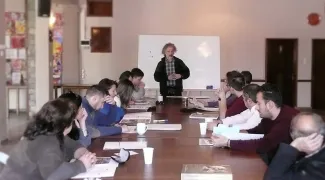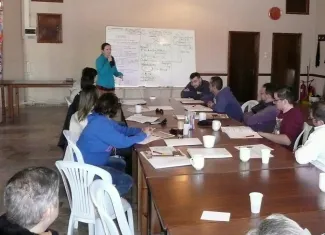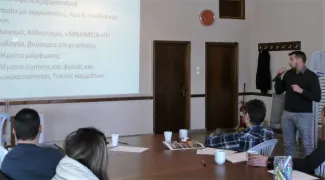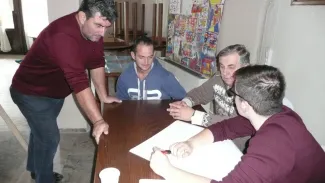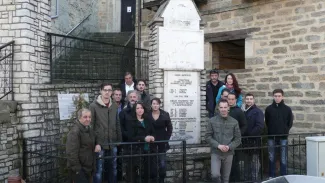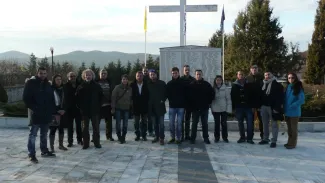Part II: "Step-in" in Lehovo - the step towards European Voluntary Service
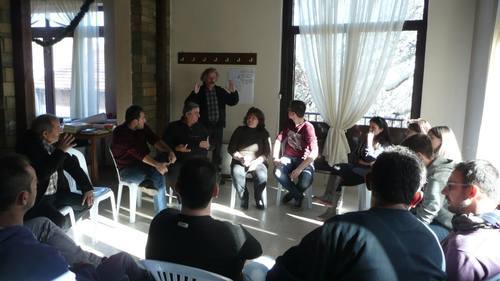
Part II of the seminar for multipliers from Martyr Communities of Greece, took place in Lehovo Florinas in Northern Greece (17-20 December 2015), supported by the German-Greek Fonds for the Future. EVS (European Voluntary Service) and the German voluntary service programme FSJ/FÖJ have been the topics of this seminar.
The introduction focused on team building games to break the ice and went on with a group discussion in order to discover fears and expectations of the participants. Following the discourse, the participants had an intensive introduction into the basics of EVS. Questions arose and heated debates took place. “How can small societies deal with strangers? How do we overcome language barriers? What happens if a volunteer faces various challenges?” The issues were many and had to be extensively analyzed.
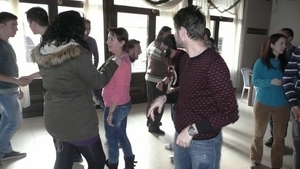
The seminar focused on the complete organization of an EVS programme. From the practical question of entering the EVS database and applying for a PIC number, the issues of financing, receiving and accommodating volunteers over the planning of a volunteer programme and the activities involved, to the conception of a self made voluntary plan for their own communities. The range was broad and the seminar aimed at enabling the participants to create their own EVS programs for their own communities.
The methods used in the seminar varied greatly. Experiential games and group activities were combined with real case scenarios and case studies, while frontal teaching methods were followed by group discussions and team-work exercises. The use of multimedia in form of video and web interfaces was also applied. Visits to the local museum, the local church, as well as the visits to neighboring Martyr Communities enriched the program and facilitated a better understanding of the history of the area of West Makedonia in Greece.
The second part of the seminar has been completed successfully and it involved: enlivened learning through team-building activities, introduction to European Voluntary Service, deepening knowledge on EVS and case studies. The participants had time to develop their own plans for EVS in their communities and debated possibilities with the whole team.
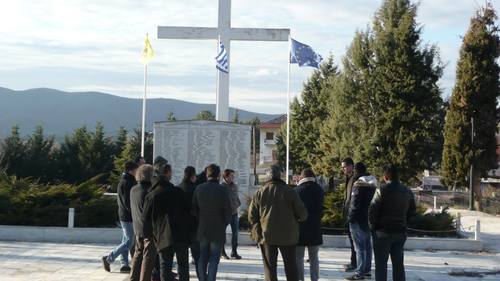
The experience in Lehovo was special because it took place in a Martyr Community. In addition, the seminar group visited another two Martyr Places, the village Mesovouno and the village Kleissoura. Both suffered greatly during the Nazi Occupation of Greece. This experience was and is paramount for the whole group as the participants belong to such communities and appreciate the connection with places that have suffered similarly to their own.
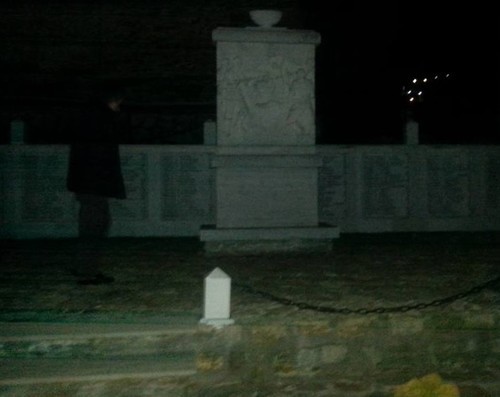
EVALUATION AND CONSTRUCTIVE CRITICISM
As presented in PART I in Kryoneri the seminar conductors followed the participants’ wishes to improve for PART II. The main criticism has been evaluated by the seminar conductors and is listed below:
- The seminar conductors have provided great insights
- More time to discuss own plans is needed
- It was important to visit other Martyr Places and learn more about them
- More Communities have to participate
- The program facilitated networking with people from other Martyr Communities
- Support to conduct own voluntary service programs is needed / more know-how must be provided
The criticism for PART II in Lehovo has been even more positive than in PART I in Kryoneri. This is mainly because the conductors managed to cover the participants’ needs after receiving the constructive ideas of the seminar in Kryoneri but also because the group participants’ knew each other and managed to deepen their debates easier.
New ideas for future cooperation in the field of youth in Martyr communities in Greece have been developed. Finally, all participants welcomed the idea of a common web presence for Martyr communities. This way, Martyr communities of Greece would have an online presence, where they can network with each other and with other institutions/persons that are interested in Martyr communities and will be able to present their concerns world wide
Filoxenia’s Team
Filoxenia compiled a team of trainers for the seminar that consists of the following persons:
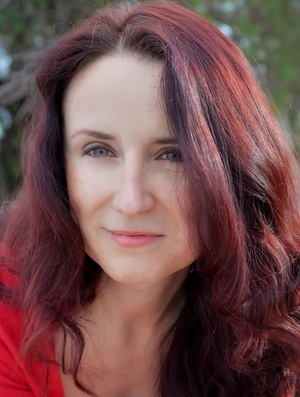
Mrs Hana Sebestova, ΜΑ Arts teacher / Youth Worker / Council of Europe's Human Rights Educator (Κryoneri Korinthias) is currently living in Corinth Greece and has studied Fine Arts & Music in Slovakia and the Czech Republic. Hana has lived in multiple European countries and has conducted various international youth exchange programs over the last years.
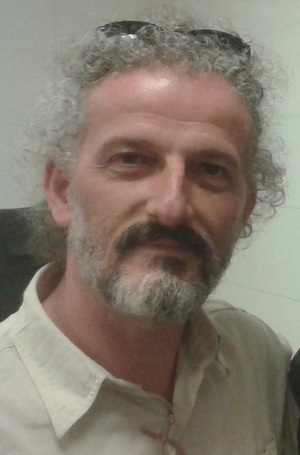
Mr Panos Poulos, Dipl.-Pol., Youth Advisor, Project's coordinator (Κryoneri Korinthias) lives in Kryoneri and found back to his place of origin after studying in Berlin (Germany) to become a political scientist. Panos gained his first youth work experiences in Germany, returned to Greece in 1995 and is a founding member of Filoxenia. He accommodates over 20 years of youth work experience.
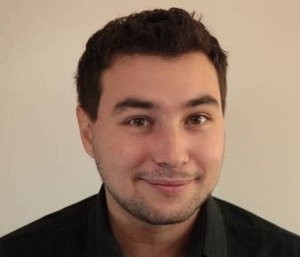
Mr Charalampos - Babis – Karpouchtsis MA.-Pol. (www.polisis.eu), Political Consultant (Berlin) is a Greek political scientist based in Berlin, Germany. Originally from Thessaloniki, Babis has lived in Greece, Germany and the UK and has been working as a group trainer and seminar conductor with a focus on Greek and German politics for the last three years.
'Step-in' in Lehovo
-seminar Zum EuropÄischen Freiwilligendienst (EVS)
Für multiplikatoren aus märtyrergemeinden in Griechenland
TEIL ii: Step-in in Lehovo -der schritt zum europäischen Freiwilligendienst
Erste Gruppendiskussion
Teil II des Seminars fand in Lechovo Florinas Nordgriechenland (17-20 Dezember 2015) mit der Unterstützung des Deutsch-Griechischen Zukunftsfonds statt. Der Europäischen Freiwilligendienst (EVS) und der deutsche Freiwilligendienst (FSJ/FÖJ) waren die Hauptthemen dieses Seminars.
Die Einleitung konzentrierte sich auf Team-building Spiele, um das Eis zu brechen und ging in eine Gruppendiskussion über, um Ängste und Erwartungen der Teilnehmer_innen zu besprechen. Nach der Diskussion gab es eine Einführung zum EVS. Unterschiedliche Fragen befeuerten die Debatte. „Wie können geschlossene Gemeinden mit Fremden umgehen? Wie überwindet man die Sprachbarrieren? Was passier wenn ein Freiwilliger Schwierigkeiten in der Gemeinde hat? Die Themen waren vielfältig und mussten bis ins Detail analysiert werden.
Das Seminar fokussierte auf die Aufarbeitung und Planung eines gesamten Freiwilligenprogramms. Von praktischen Fragen wie, wie kann man seine Institution in die EVS-Datenbank registrieren und wie bekommt man eine PIC-Nummer, über Problematiken der Finanzierungs, das Aufnehmen und Unterbringen von Freiwilligen, über die Planung der Aktivitäten der Freiwilligen, bis zur Konzeption eines selbstgemachten Freiwilligenprogramms für die eigene Gemeinde. Das Spektrum war sehr breit und das Ziel des Seminars bestand darin, die Teilnehmer_innen eigene Programme zu planen, zu befähigen.
Teambuilding Spiele
Die angewendeten Methoden variierten. Erfahrungsspiele und Gruppenaktivitäten wurden mit Fallbeispielen kombiniert. Frontale Vorträge wurden mit Gruppendiskussionen und Gruppenarbeiten ergänzt. Die Nutzung von Medien, wie Film, Video und Internet hat das Programm bereichert. Außerdem hat die Seminargruppe das örtliche Museum, die Kirche und zwei weitere Märtyrerdörfer der Region besucht. Diese Besuche haben den Teilnehmer_innen einen besseren Überblick über die Geschichte der Region Westmakedoniens ermöglicht.
Besuch des Mesovouno Monuments
Der zweite Teil des Seminars ist erfolgreich abgeschlossen worden und beinhaltete: praxisnahes Lernen duch Gruppenaktivitäten, Einführung und Vertiefung zum EVS, sowie Fallbeispiele. Die Teilnehmer_innen hatten die Zeit eigene EVS-Pläne zu schmieden, die danach in der Gruppe erörtert wurden.
Besuch des Kleissoura Monuments
Die Erfahrung in Lechovo hatte einen besonderen Stellenwert, weil das Seminar in einem Ort des Grauens stattgefunden hat. Hinzu kommt der Besuch zwei weiterer Märtyrerdörfer, das Dorf Mesovouno und das dorf Kleisoura. Alle drei Orte haben unter der Gräultaten der Nazis im Zweiten Weltkrieg stark gelitten. Diese Erfahrung war und ist von höchster Bedeutung, da die Teilnehmer_innen aus solchen Gemeinden kommen und eine starke Verbundenheiten zu den Menschen der anderen traumatisierten Gemeinden fühlen.
EVALUATION UND konstruktive kritik
Wie im Teil I in Kryoneri präsentiert, sind die Seminarleiter auf der Kritik des ersten Seminarteils eingegangen, um den zweiten Teil an die Teilnehmer_innen anzupassen. Die wesentlichen Kritikpunkte werden hier aufgeführt:
- Das Seminar hat eine tiefe Einsicht ins EVS-Programm geboten
- Mehr Zeit zur Diskussion eigener Pläne ist nötig
- Es war wichtig andere Märtyrergemeinden zu besuchen und mehr über diese zu lernen
- Mehr Gemeinden sollten mitmachen
- Das Programm ermöglichte das Netzwerken mit Menschen anderer Märtyrerdörfer
- Unterstützung zur Durchführung eigener EVS-Projekte ist nötig
Die Kritik von Teil II ist noch positiver als die von Teil I. Das lag einerseits daran, dass die Seminarleitung besser auf die Bedürfnisse der Teilnehmer_innen eingehen konnte, nachdem die konstruktiven Ideen des Seminars von Kryoneri aufgearbeitet wurden. Andererseits haben sich die Teilnehmer_innen schon gekannt und haben zügiger tiefgreifende Gespräche führen können. Neue Ideen für zukünftige Projekte im Bereich Jugend und Freiwilligendienst für Märtyrergemeinden sind entstanden. Zum Schluss haben sich alle Teilnehmer_innen für die Entstehung eines Onlineauftrittes entschieden, damit sich alle Märtyrerorte online präsentieren können, um die Vernetzung zwischen den Zivilgesellschaften der Märtyrergemeinden und weiteren Interessenten zu befördern, um ihre unterschiedlichen Anliegen öffentlich präsentieren zu können.
